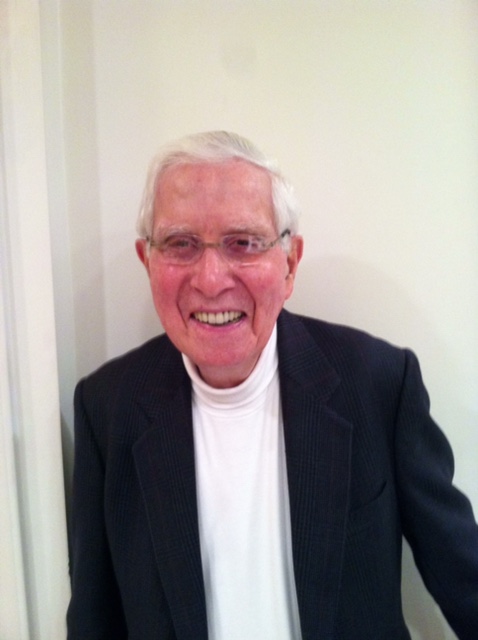Harvey Moser, a 47-year Great Neck resident, was a child when anti-Semitism reached a fever pitch in Europe. Hitler was elected in 1933. Signs that said Jewish people weren’t welcome dotted Haslach, a German farm town of about 3,000 people where he lived. Brownshirts marched down the main street, singing loudly.
“When Jewish blood spurts from the knife, all will be well,” Moser recalled hearing in German. “That was not very encouraging.”
Shortly after the passage of the Nuremberg Laws, which barred Jews from owning businesses, Moser’s father had to sell his animal hide business. The family moved to Freiburg, about 47 kilometers away, in 1938. Moser and his older brother, Eugene, attended a nearby Jewish state school, part of the local synagogue.
But then everything changed.
“One day my mother said you don’t have to go to school today,” Moser, now 88, said.
Their school and synagogue had been burned down during Kristallnacht, or “the Night of Broken Glass,” where thousands of Jewish properties were destroyed or damaged across Germany. His father was among tens of thousands of Jews rounded up and put into camps.
Moser said his father was sent to Dachau, which was more of a prison than a camp at the time. He then managed to bribe his way out.
“At that time, you could still buy your way out. He was there for six weeks,” Moser said, noting this was before the Nazis openly discussed a “final solution.” “In 1943, there was no such thing as buying your way out.”
After hearing rumors that Jewish children would be deported to concentration camps, Moser’s parents decided to smuggle him and his brother to France in the middle of the night. A woman removed the pictures of her children in a set of passports, and pasted the boys’ photos in her place — and a guard, he recalled, winked at her.
Moser and his brother stayed with separate cousins as illegal immigrants. Moser was in Guebweiler, a part of Alsace-Lorraine near the Franco-German border, for about a year.
“If the police got a hold of us, they would send us back to Germany,” Moser said. “We could not leave the house.”
After six months, Moser’s parents managed to secure passage aboard the S.S. St. Louis in 1939. Moser said that between obtaining visas and boarding the ship, it cost around $900.
“On the other hand, all the other money you might have had, gold, silver, stamp collection, all that had to be left behind,” Moser said.
The 10-day voyage took them to Havana, Cuba. They were initially told there would be a one-day delay. Then they were told to wait another day. But on the third day, they were rejected. “We were told that these visas that were issued by the consul in Hamburg were bogus, they were worthless,” he said.
The American Jewish Joint Distribution Committee sent a representative to try and push the Cuban government into letting the St. Louis passengers stay. The government demanded $500 per passenger within 48 hours. But when the committee came up with the money, it was eight hours too late.
“There was a tremendous amount of uproar among the passengers,” Moser said. “I was standing next to a man. Before I know it, he takes a knife, cuts his wrist, and jumps overboard.”
Because the man was taken ashore to get medical treatment, he was among the few who got to stay in Cuba. His wife, who requested to see him, was denied. Everyone else had to stay aboard the ship.
The committee appealed to nations all around the world, starting with the United States, which denied entry. China and the Dominican Republic were considered. Ultimately, England, France, Belgium and Holland decided to accept the Jewish refugees.
The Mosers returned to France. Moser said he and his brother stayed in an orphanage in Paris, his father was interned in a camp for foreigners near Léon, France, and his mother, in a home for wives of detainees, worked to secure affidavits so the family could go to the United States.
In 1940, as the war picked up, the Mosers managed to secure a spot on a freighter to the United States and find safe harbor in New York City.
The ship was sunk by a German U-Boat before it could return to France.
From there, Moser went on to serve in the U.S. Army in the 1950s, attend New York University on a scholarship and graduate from NYU Medical School. He had a private dermatology practice in Forest Hills for 49 years before retiring.
“Having been through all this, [I can say] America is wonderful,” Moser said. “America is the only country in the world where you could do or accomplish what I was able to accomplish.”
Moser, who will tell his story at Temple Israel on Sunday, April 23, for Holocaust Remembrance Day, said he will continue telling this tale for as long as he can.
“I know that there are not many of us left. I think it’s becoming more important to spread this message around,” Moser said, noting he has given five or six talks on the subject.
And that message, he said, was that people should remain resilient and that something like the Holocaust can never be allowed to happen again.



